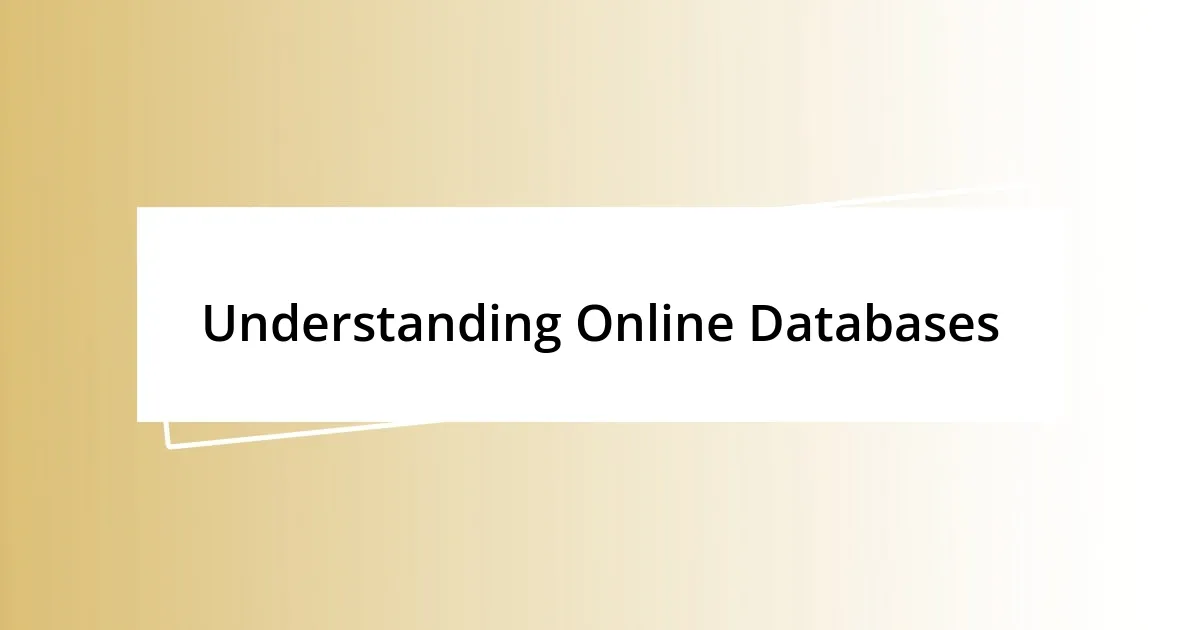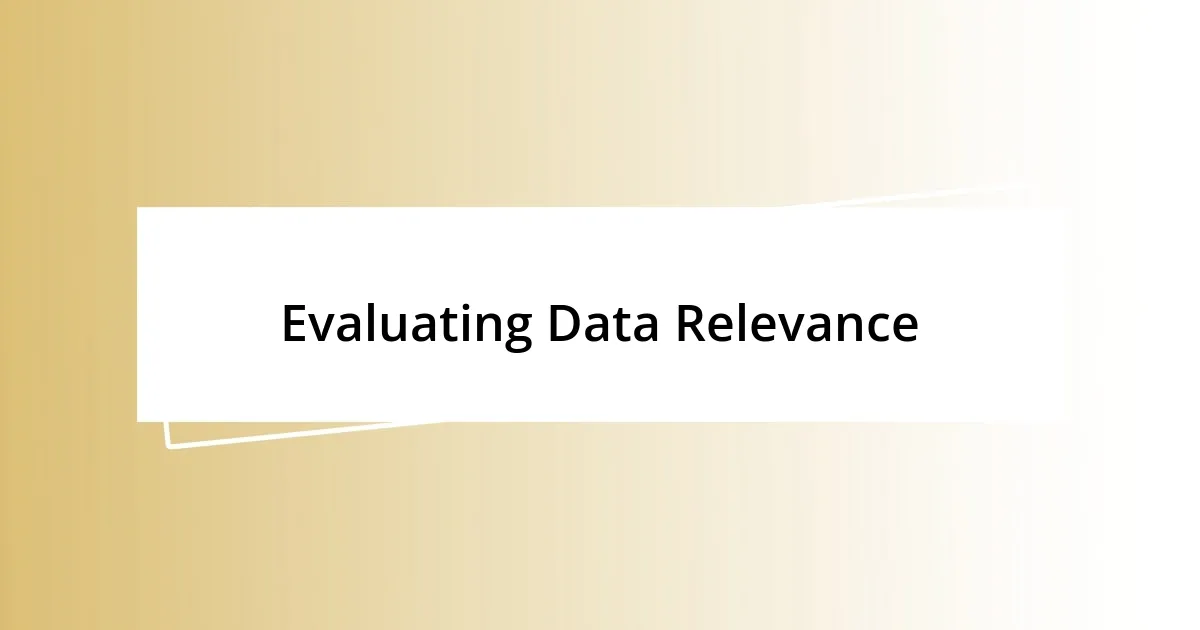Key takeaways:
- Understanding the types of databases (relational vs. non-relational) is essential for effective information retrieval.
- Creating effective search strategies, including defining keywords and using Boolean operators, enhances the quality of search results.
- Evaluating data relevance involves scrutinizing sources and understanding the context of information to ensure it aligns with research objectives.
- Organizing search results through categorization and tracking tools improves research clarity and helps synthesize insights efficiently.

Understanding Online Databases
Understanding online databases can seem daunting at first, but I remember my initial experience diving into one. I felt overwhelmed by the sheer volume of information available at my fingertips. It made me question how I would ever sift through it all! However, once I grasped the basics—like knowing the types of databases, such as relational and non-relational—it transformed the experience into a fascinating journey.
As I began to navigate these online systems more confidently, I realized they’re not just giant libraries of data; they are dynamic tools designed to help us find specific answers efficiently. For instance, using a database for research feels a lot like being a detective piecing together clues. Why dig through multiple sources when a well-structured database can provide targeted results with just a few clicks?
When I reflect on my growth in understanding online databases, I can’t help but marvel at how they empower us to make informed decisions quickly. They make me feel like I have the world of information at my disposal. Have you ever felt the rush of finding that perfect piece of data that changes everything? That’s the magic behind a well-navigated online database, unveiling insights you didn’t even know you were missing.

Choosing the Right Database
Choosing the right database is crucial to harnessing the power of online information. From my experience, understanding the specific needs of your project can guide you beautifully to the right choice. For instance, when I was selecting a database for a research project, I found that a relational database was perfect for storing structured data, allowing me to create complex queries effortlessly.
As I navigated through various options, I realized that non-relational databases were better suited for unstructured data like social media posts. I remember the satisfaction I felt when I chose a non-relational database for a marketing analysis project; it allowed me to collect vast amounts of varied data and present it coherently. That flexibility made all the difference and helped me glean important insights.
Ultimately, the decision comes down to a few key factors: the type of data you’re working with, scalability requirements, and the complexity of the queries you’ll need. Engaging with these considerations not only streamlines your workflow but also enhances your understanding of how databases operate in different contexts.
| Feature | Relational Database | Non-Relational Database |
|---|---|---|
| Data Structure | Structured | Unstructured |
| Query Complexity | High | Low/Medium |
| Scalability | Vertical | Horizontal |
| Best Use Case | Financial records | Big data analysis |

Creating Effective Search Strategies
Creating effective search strategies is all about refining your approach to find the information you need. I’ve often found that breaking down my search into manageable parts yields the best results. For instance, when tackling a research question, I start by identifying key terms related to the topic. This approach not only narrows down the scope but also enhances the clarity of what I’m looking for.
Here are a few tips that have worked well for me when creating search strategies:
- Define Keywords: Identify specific keywords related to your topic. Try synonyms and variations.
- Use Boolean Operators: Incorporate AND, OR, and NOT to refine your searches and expand or narrow results effectively.
- Leverage Filters: Don’t shy away from using filters available in databases, like date ranges or document types, to zero in on the most relevant information.
- Keep a Record: Document your search terms and strategies; this helps you learn what works best for future queries.
- Adjust as Needed: If your initial search doesn’t yield the expected results, tweak your terms or approach. Flexibility is key!
The next time I needed specific statistics for a project, I vividly remember feeling the pressure to find trustworthy data quickly. I tried a series of searches using different keywords and constantly adjusted my entry queries. Each time I hit a dead end, my initial frustration turned into determination. Finally, I discovered a treasure trove of information by simply altering my search parameters. It was a small victory, but it reinforced the power of a thoughtful search strategy. It’s those little successes that can completely transform your experience with online databases!

Utilizing Advanced Search Techniques
Utilizing Advanced Search Techniques
When I dive into advanced search techniques, I think of it as unlocking a treasure chest of information. For instance, using field-specific searches can significantly narrow down results. I often restrict my queries to titles or abstracts; by doing so, I feel a surge of excitement as I watch the irrelevant results dwindle, leaving behind only the most pertinent data.
One time, I was tasked with writing a report on renewable energy trends, and I decided to utilize proximity searches. I typed in “solar energy” NEAR/5 “market growth.” This little tweak revealed articles that discussed these terms within close context, something I wouldn’t have discovered otherwise. Isn’t it fascinating how fine-tuning your search can lead to unexpected insights?
In my journey through databases, I’ve also learned the importance of searching within specific date ranges. Just the other week, while researching tech innovations, I set my search parameters to the last two years. That choice allowed me to witness the freshest developments, making my research relevant and timely. Have you ever felt the exhilaration of finding exactly what you need at just the right moment? It’s moments like those that highlight the true power of advanced search techniques!

Evaluating Data Relevance
When it comes to evaluating data relevance, I’ve learned the value of scrutinizing the source. I remember sifting through articles for a school project only to realize that some were from dubious websites. The disparity in quality hit me; reputable sources like academic journals and industry reports consistently offered more reliable and precise information. Have you ever found yourself questioning the validity of a source? It’s a moment of disbelief that can turn into a learning opportunity.
Another aspect I keep in mind is the context of the information. Just the other day, I was looking for health statistics and stumbled upon both current and outdated studies. It became apparent to me that relying solely on the latest data wasn’t enough. It’s essential to understand the background of the study and its relevance to the present situation. The correlation between data and its applicability can be revealing—what’s the point of using information that doesn’t fit your current landscape?
Lastly, I always ask myself how the data fits into my overall research narrative. Recently, I encountered a fascinating study on climate change that seemed relevant at first glance. But as I reviewed the methodology and goals of the research, I realized it didn’t align with my focus on sustainable technologies. This reflection is crucial; aligning data with your purpose not only clarifies your findings but also enhances the strength of your arguments. Have you ever had to let go of intriguing data simply because it didn’t fit? It’s tough but essential for effective research.

Managing and Organizing Results
Once I get my search results, the next step is managing those results effectively. I often start by sorting through them using built-in features like filters and tags. It might seem tedious, but when I take that extra time to categorize my findings into folders—like “Must Read” or “Interesting” —I can quickly reference them later. Have you ever felt overwhelmed by too many results? Trust me, a little organization goes a long way in streamlining the research process.
Another method I’ve found helpful is creating a detailed spreadsheet to track my results. This approach allows me to add columns for critical details like citation info, relevance scores, and notes on each piece. I’ll never forget the time I had to compile a comprehensive literature review; without that spreadsheet, I would’ve lost track of key articles and their connections. Isn’t it amazing how a simple tool can enhance the clarity of your research?
Finally, I can’t stress enough how essential it is to prioritize my findings based on relevance and quality. I often create a quick rank system: “5-star” for the most valuable articles I come across, and “1-star” for those that are merely average. During a project on climate policy, this clearly highlighted which studies truly shaped my understanding and argument. Have you ever considered ranking your sources this way? It’s a practical technique that transforms the chaos of information into a curated collection, making it easier to synthesize insights down the line.

Tips for Regular Database Use
When using online databases regularly, I’ve discovered that developing a routine can make a significant difference. Each time I log in, I take a moment to set specific goals for my search, whether it’s finding articles on a niche topic or gathering data for a larger project. I once went into a search unprepared and ended up sifting through irrelevant material for hours. Have you ever felt lost in a sea of information? Establishing clear objectives transforms that chaotic experience into a focused, productive session.
Another strategy I’ve adopted is jotting down notes during my research. I don’t just bookmark articles; I summarize the key points while they’re fresh in my mind. This practice has saved me on more than one occasion, especially when I found a promising article only to realize later I couldn’t remember why I had saved it. The act of writing something down helps solidify the information in my memory. Don’t you think that retaining insights gets much easier when you connect them with your own thoughts?
Lastly, I always remind myself of the importance of revisiting and reflecting on previous searches. There have been instances where I was convinced I’d left no stone unturned, only to stumble upon overlooked papers weeks later. Taking a few minutes to review past searches or saved items not only sparks new ideas but also reveals connections I might have missed. Have you ever experienced that little thrill of discovery while revisiting your research? It’s moments like these that remind me how layered and rewarding the journey of research can be.














